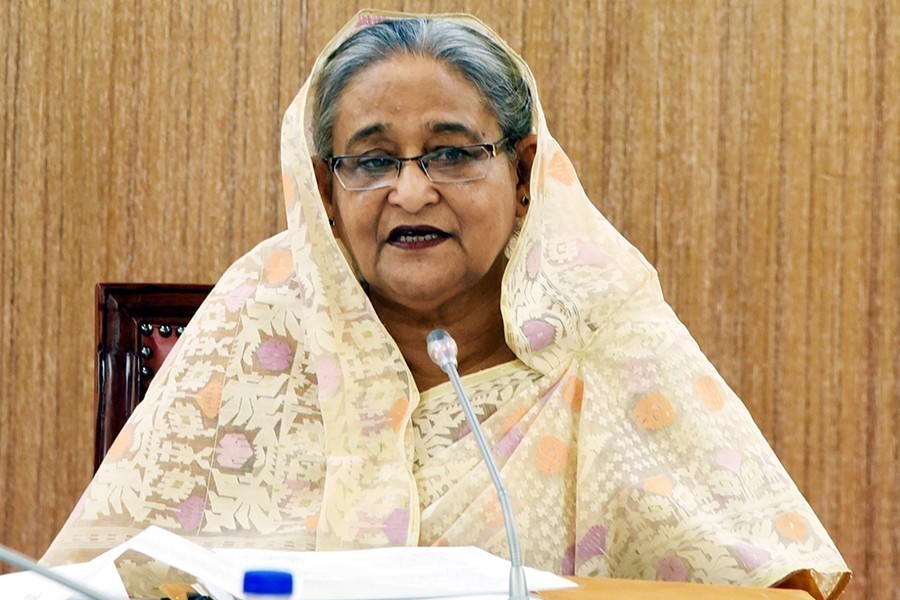Prime Minister Sheikh Hasina on Friday said the image of Bangladesh has become brighter in the world arena in the last 14 years since her government has taken power in 2009.
"Today none treats Bangladesh as a country of floods, droughts and disasters. Bangladesh is now an emerging economy and a role model for development," she said.
The premier was addressing the nation through state-owned Bangladesh Television and Bangladesh Betar, marking the fourth anniversary of her current government formed on January 7, 2019 following the 11th national election held on December 30, 2018.
PM Hasina said Awami League has been in the charge of governing the country for 14 years in a row after the formation of government in 2009, as per a UNB report.
"Our country has progressed a lot. But we have to take it forward further. Achieving a developed and prosperous Bangladesh is our goal. After building Digital Bangladesh, our next goal is to build a Smart Bangladesh," she said.
She said the use of robotics, artificial intelligence, nanotechnology, genetic engineering, biological technology and digital devices will be ensured in all fields including the industrial, trade-business, health, education and agriculture sectors in a bid to build Smart Bangladesh, having smart government, smart population and smart industrial factories. "Emphasis has been placed on research in all areas," she added.
The PM focused her government's successes in bringing the cent per cent population under electricity coverage, strengthening road and rail connectivity, increasing food production, implementation of different large projects including Padma Bridge, metro-rail, Bangabandhu Tunnel under Karnaphuli River, Rooppur Nuclear Power Plant, Dhaka-Mawa-Jajira Expressway, Bangabandhu-1 Satellite, 16-km Dhaka Airport-Kutubkhali Elevated Expressway projects, and setting up 100 economic zones.
She said the prices of daily essentials including fuel have soared also in Bangladesh as it happened at abnormal rates in the world due to the Russia-Ukraine war following the Covid-19 pandemic, sanctions and counter-sanctions imposed by the Western countries and Russia.
"We are purchasing some commodities at higher prices and distributing those at lower prices to the people with limited incomes," she said adding that 10 million families can purchase rice at Tk 30 per kg and edible oil, pulses and sugar at affordable rates through TCB's fair price cards, while five million families can buy rice at Tk 15 per kg in a month.
The PM depicted the present scenario of Bangladesh in different social and economic indicators, comparing to the situation 16 years ago at fag end of BNP-Jamaat alliance rule.
She said the per capita income increased to US$ 2,824 now from US$ 543 in the FY 2005-2006, while poverty rate declined to 20 per cent from 41.5 per cent, the average life expectancy increased to 73 years from 64.5 years and the literacy rate to 75.2 per cent from 45 per cent.
She said the GDP increased to US$ 460.75 billion in FY 2021-22 from only US$ 60 billion, the size of national budget to Tk 6.78 trillion in the FY23 from Tk 610.57 billion, the export earnings to US$ 52.08 billion in FY22 from US$ 10.52 billion, and the remittance inflow went up to US$ 22.07 billion in FY22 from only US$ 4.80 billion.
She said the reserve of foreign currencies increased from only US$ 3.5 billion in FY06 to US$ 48 billion in 2021, but declined to US$34 billion now due to the global economic downturn and high inflation. Still Bangladesh has a sufficient reserve to meet the five-month export expenditures, she added.
The PM said the allocation against the social safety net programmes rose to Tk 1.136 trillion in the current fiscal year from only Tk 3.73 billion in FY06, while the subsidy to the agriculture sector went up to Tk 400 billion from Tk 5.92 billion.
She said the electricity generation capacity has increased to 25,826 megawatt now from only 3,600 megawatt at the end of BNP-Jamaat regime and the population under the electricity coverage to 100 per cent from only 45 per cent in the same period. "We ensured electricity facilities to cent percent people in 2022. We illuminated all the houses," she said.
Hasina said Bangladesh is currently the 41st largest economy in the world. Today, Bangladesh has graduated to a developing country from a least developed country, she said.
Noting that Bangladesh has attained a revolutionary development in the communication sector, she said her government constructed and reconstructed hundreds of highways as well as bridges over major rivers, including Padma Bridge, Bangabandhu Jamuna Bridge, Teesta Bridge, Payra Bridge, 2nd Kanchpur Bridge, 2nd Meghna Bridge, 2nd Gomti Bridge in the last 14 years in order to establish an uninterrupted road and rail connectivity.
PM Hasina said some 100 bridges were simultaneously opened in a single day in November last, while some 100 roads were inaugurated simultaneously in a day in December last.
"This is a unique achievement in the development history of the country," she said, adding that some 718 kilometres of highways have been upgraded to four or above lanes in the last 14 years.
"Today, the people have started reaping the benefits of our visionary plans," she said
Noting that Father of the Nation Bangabandhu Sheikh Mujibur Rahman dreamt of building an exploitation-and- deprivation-free Sonar Bangla (golden Bengal), she urged all to come forward to realize his dream by building a happy-prosperous non-communal Bangladesh.
"Let's work to build a smart country and bring smiles on the faces of the common people of this country," she told the nation.


